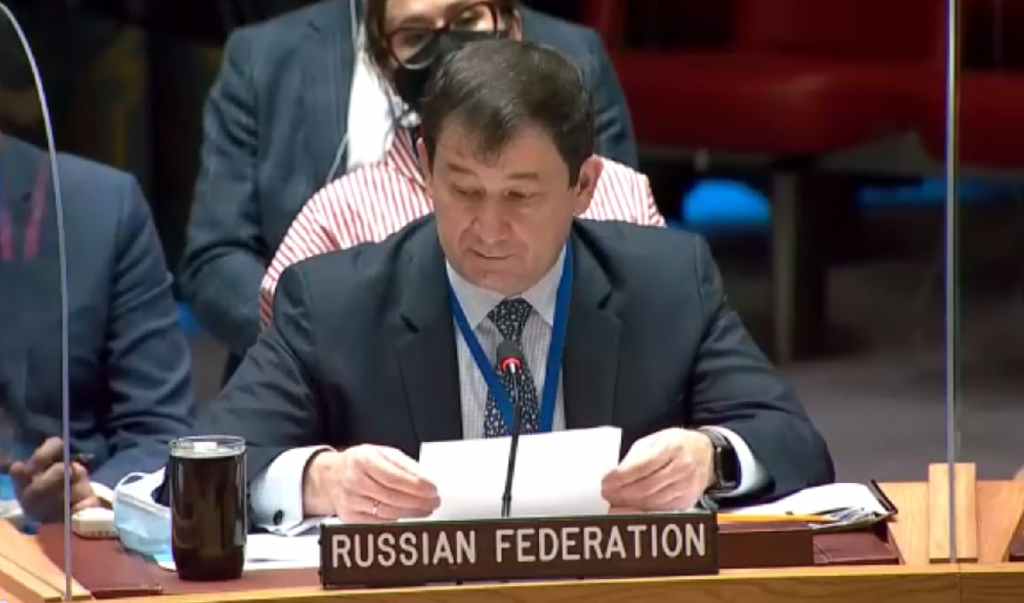Statement by First Deputy Permanent Representative Dmitry Polyanskiy at the joint briefing by Chairs of subsidiary anti-terrorism bodies of the Security Council
Mr.President,
We appreciate the meaningful briefings on the work of UNSC Committees 1267/1989/2253, 1373 и 1540 that we just heard.
We are thankful to the Norwegian Chairmanship of Sanctions Committee 1267/1989/2253 on ISIL and Al-Qaida for the able leadership and readiness to approach issues constructively.
We give a positive assessment to the work of this Committee. We believe it is among the most effective SC mechanisms at counter-terrorist track.
In our view, effective implementation of UNSC resolutions on anti-terrorism sanctions regime with regard to ISIL/Al-Qaida is a task of fundamental importance. The Afghan wing of ISIL remains one of the key factors destabilizing the country. ISIL’s expanding ideological, propaganda, and recruiting activity that ably uses information and communication technologies poses additional threat. This terrorist group retains its presence in the country, which we consider as a threat to Afghanistan’s neighbors in Central Asia. Increase in the number of terrorist attacks carried out by suicide bombers indicates that this group has enough manpower.
We underscore that we need to keep in focus the problem of FTFs –those who have been added to anti-terrorist sanctions lists – so that to prevent and curb their criminal activity.
We support the effective work of the Monitoring Group, on which reports the Committee very much relies in its operations. We call upon member states to interact closely with the experts. Thereby we expect the reports of the Monitoring Group to be objective and proceed only from verified sources of information.
Another important aspect is country visits of the Monitoring Group. Thereby we expect that priority will be given to countries in a state of armed fight against international terrorism, and countries that have close encounters with terrorist manifestations.
Mr.President,
We also would like to express appreciation to the Tunisia Chairmanship of the Counter-Terrorism Committee (CTC) for highly professional leadership of the CTC. We realize that it was far not easy during the COVID-19 pandemic.
In general, the Committee was able to adapt and keep up its crucial function of assessing states' progress in implementing the corresponding UNSC resolutions.
We thank the Executive Directorate (CTED) of the CTC for preparing draft Global Surveys of implementation of SC resolutions 1373 and 1624.
In light of the current limitations related to disease control and prevention, provisional procedures for hybrid visits are in effect. It means that some meetings run online. We count on gradual return to the normal mode of operation of the CTC.
We welcome that the CTC again meets in erson, and count on more active involvement of the CTED in addressing administrative issues. In future, we would very much like to avoid situations where sessions are repeatedly rescheduled, and documents to be endorsed by the Committee members are distributed on short notice.
From the point of view of session management, it was the optimal solution to organize a joint meeting of the CTC and the Committee on ISIL/Al-Qaida on countering the financing of terrorism that convened on 18 November 2021.
We commend the competent expert support for the Committee on the part of CTED. The Executive Directorate continues playing a significant role in solving various tasks on CTC and UNSC agenda in the area of countering terrorism. It is essential that CTED should keep its status as a political mission and its exclusive authority to assess the efforts of states in combating terrorism. We would like to thank Ms. Michele Coninsx for her productive work as the Executive Director.
Mr.President,
We also thank the Mexican Chairmanship of Committee 1540.
In general, we are satisfied with the progress of UNSC resolution 1540, which remains the only universal international document in the area of WMD non-proliferation, under which all states have an obligation to create effective national systems for controlling WMDs in order to prevent WMDs, their delivery systems and related materials from falling into the hands of non-State actors. It is our common goal to ensure that all states implement this resolution to the full extent.
Committee 1540 is called to act as coordinator of global efforts in this area. The Committee’s priority track is provision (upon request) of technical assistance to countries in implementing the provisions of the resolution. We believe it is pivotal that UNSC resolution 1540 must remain an instrument of cooperation in the area of non-proliferation.
As the United Nations is getting back to normal offline operation, we trust that the Committee will boost activity at all tracks, and will soon carry out the Comprehensive Review of the Status of Implementation of Resolution 1540 that should have taken place back in 2020.
Thank you.
